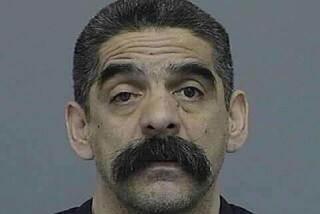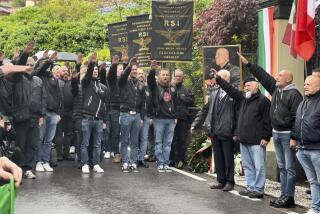Drive on Mafia Stalls; Italians Seek New Strategy
- Share via
ROME — Only months after its biggest success, Italy’s campaign against the Mafia is a shambles. Counterattack by the Sicilian criminal syndicate seems less to blame than government inertia and the torpor of Italy’s judicial bureaucracy.
Faced with the resignations of judges and police in crime-ridden Sicily, Italian politicians and lawmakers are abandoning their vacations to confer in steamy Rome in search of a new anti-Mafia strategy.
After many years of little but rhetoric from Rome, Sicilian reformers stung the Mafia last December by convicting 338 gang members in a 20-month mass trial in Palermo. Nineteen Mafia leaders were sentenced to life in prison.
Afterward, Sicilian judges, prosecutors, police officers, priests and politicians urged a vigorous follow-up by the central government. Instead, the government dropped the ball, according to Sicilian activists who have challenged death and tradition to fight the Mafia.
Last month, Paolo Borsellino, the chief government prosecutor in the Mafia-dominated Sicilian town of Marsala, charged that a team of expert anti-Mafia judges in Palermo was breaking up and that police work was deteriorating. Under Italian law, magistrates not only try criminal cases but investigate them as well.
“Investigations have meandered off into a thousand channels while the Cosa Nostra has reorganized itself as before--more than before,” Borsellino said. “I have the unpleasant sensation that somebody is trying to turn back the clock.”
Meanwhile, Mafia reorganization since the mass trial has been marked by a string of unsolved killings. Victims include a former Palermo mayor, an undercover policeman and six defendants acquitted in the trial.
As the government sought to cope with disaffection among its Mafia fighters, Leoluca Orlando, the reformist mayor of Palermo, told a national television audience last week: “Today we are worried that there could be a return to the past, a return to the years when it was said--and was true--that magistrates, policemen and politicians colluded with the Mafia.”
Status Report Sought
After Borsellino’s complaint, President Francesco Cossiga, who oversees the Italian judiciary, called for a status report on the anti-Mafia campaign. But before one could be produced, there was further revolt in Palermo.
Judge Giovanni Falcone, the key figure in the mass trial, and eight other Palermo magistrates who formed with him the so-called anti-Mafia pool stunned the government by demanding reassignment. Falcone, a 48-year-old Sicilian who for five years as an anti-Mafia judge has lived inside a protective cocoon of 25 bodyguards, is the symbol of Sicily’s commitment to fight the Mafia.
Earlier this year, Falcone was passed over for the post of chief investigating magistrate in Palermo. The job went instead to the senior judge, Antonino Meli, 68, who has ruled that all judges, including the Mafia specialists, are to try all kinds of cases, from petty larceny to rape to Mafia murder.
“What I feared has happened,” Falcone wrote in a letter requesting transfer. “The investigations into the Mafia have been obstructed, and the anti-Mafia pool is now stalled.”
Meli replied: “The pool has not been destroyed. If anything, it has been enlarged with the addition of other judges.”
But by most other accounts, the anti-Mafia campaign is flagging.
Magistrate Giuseppe De Lello, a Falcone ally, said that “the inattention of the government is palpable in the disorganization of the investigating offices.”
Two of Palermo’s top police officers, Chief of Detectives Antonino Nicchi and Chief Investigating Officer Saverio Montalbano, asked this week to be transfered from Palermo.
The Mafia killed Montalbano’s predecessor three years ago and Falcone’s two years before that. Evidence from 1,300 witnesses at the mass trial documented murder as routine policy in Sicily and New York for the Mafia, an organization that derives its principal income from trafficking in heroin.
In Sicily, the Mafia is active in virtually every aspect of life, illegal and otherwise, from extortion to public works. On the Italian mainland, investigators like Falcone have long been convinced, but have never proved, that there are Mafia ties at the highest levels of business and political life.
Chief Replaced
A new detective chief from Venice with experience prosecuting Mafia figures has been named to replace Nicchi--but there is no solution in sight for the more pressing judicial dilemma.
The Superior Council of Magistrates, which oversees the national judiciary, has heard testimony here from 27 Sicilian judges and seeks a face-saving solution that would respect the traditional judicial hierarchy without losing the Falcone team.
Faced with a summer crisis it did not expect, the government of Prime Minister Ciriaco De Mita has belatedly reconstituted a long-promised parliamentary anti-Mafia commission.
The commission’s first act was to come out in defense of Falcone. But even if he is persuaded to go back to work in Palermo, it will not be easy to regain the lost momentum.
More to Read
Sign up for Essential California
The most important California stories and recommendations in your inbox every morning.
You may occasionally receive promotional content from the Los Angeles Times.












